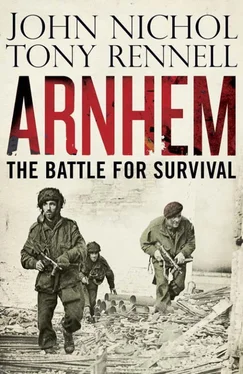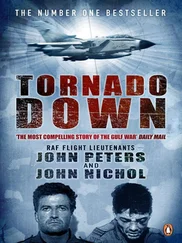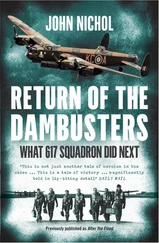For those still descending, like James Sims, the view below resembled a nest of ants. He spotted a yellow flare marking his battalion’s rendezvous point and tried to steer towards it. ‘The ground, which a moment before had seemed so far beneath me, came spinning up at an alarming rate. My right leg was dangling helplessly below me, with my kitbag, which I’d been unable to haul up, on the end of it. We’d been warned that to land in this way would almost certainly break a leg. Any second now I was going to find out. Wham! I hit the deck with a terrific jolt. But fortunately I was all in one piece. I sliced through the cords that held my kitbag and pulled out my rifle. In the distance delayed-action time-bombs exploded, sending up great fountains of earth. They had been dropped twenty-four hours previously in an effort to persuade the Germans that this was just another bombing raid. Some hopes! Something glinted in the sun not 30 yards away. A rifle was levelled straight at me. To my relief a very Cockney voice shouted, “What battalion, mate?” “Second,” I croaked. “Over to your right about 200 yards. OK?” “Thanks a lot,” I shouted, and I hoisted my 60lbs of mortar bombs on to my back, together with the pick, shovel, rifle and small pack. Looking like a Christmas tree, I set off in search of my mates.’
Less than a mile away from the drop zone where Curtis and the parachutists were landing, Horsa and Hamilcar gliders laden with men, vehicles and equipment were already down on the ground. As he bumped across the grass of the landing zone and brought his glider to a halt, pilot Sergeant Alan Kettley was relaxed and not a little pleased with himself. Job done. The take-off, he had to admit, had been nerve-wracking – 160 gliders and their Dakota tugs at Fairford in a continual stream to get airborne. ‘One aircraft was halfway down the strip and the next one was already rolling. Very difficult to do. You had to practise it.’ Careering down the runway, correct the trim, watch the airspeed indicator head to 80mph, wait for the nose wheel to judder, heave back on the stick to get the weight off the nose, then ease it forward again to keep the other wheels on the ground until the tug is airborne and you’re both up and away. Those in the back felt every bump along the ground, then the silent surge into the air. Once up there and joined by gliders from other airfields, it was ‘a magnificent, amazing sight’ in the sky over the English countryside, the glider force, six abreast, stretching as far as the eye could see, each little speck signifying between a dozen and thirty men, guns and vehicles, all heading into battle.
In the cockpit Kettley was blasé about the dangers, but they were real enough. He later discovered that his best friend was piloting a glider carrying a jeep and a trailer of ammunition in the back, ‘and the silly buggers didn’t tie them down hard enough. He took off and the jeep came straight through the front and killed him.’ On the way over, a glider was seen to explode over the sea and bodies and equipment tumble out. But Kettley’s own flight was uneventful. ‘The fighters had done a wonderful job and I didn’t see any flak at all, none. It was an easy trip into Arnhem – a piece of cake. We could see the landing zone from way out – no navigation problems.’ He lifted up into the ‘high tow’ position above the tug, shouted his thanks to the tow pilot down the intercom and dropped the rope. ‘I think we were one of the first to land because it was an empty field down there.’
Also quickly down from his release point was glider pilot and squadron commander Major Ian Toler. ‘Speed back to 90,’ he logged. ‘Half flap. Almost up to the LZ. Full flap and nose down. Terrific juddering as if we are stalling, but we are dropping fast. I aim a little short of some trees and pull up over them to get rid of surplus speed. The landing is okay and well short of the overshoot boundary. Take off the flap to run on. Halfway across we run into soft plough and we come to a rest.’
Waves of gliders were now careering in for their controlled crash-landings. Up in the air and waiting his turn, army driver and mechanic Ron Brooker glimpsed the hundreds of gliders already on the ground, some of them upside down or on their side after bad landings. ‘It was so crowded I couldn’t see any room to get in,’ he recalled. ‘I worried a bit, knowing we’d got no engine. I was more afraid of flying than the enemy. How I wished then that I was parachuting in.’ The ground rushed up, he braced and he held his breath as they hit the earth hard and the skidding glider flashed past those already parked before coming to a halt in the far corner of the LZ. ‘No straps – you just hold on and hope for the best!’ After the bumping and shaking stopped, relief washed over him. ‘We’re down, we’re here.’ [10] Ron Brooker’s account in Tribute edited by Philip Sidnell. The Military & Aviation Book Society, London, 2002, and JN interview, June 2010.
Staff Sergeant Peter Clarke was also relieved. He had been with the Glider Pilot Regiment since it was first formed back in 1942 but had not seen action. To his disgust, he missed out on the D-Day campaign because his co-pilot went down with glandular fever. ‘My frustration was building up. I wanted to contribute to the actual fighting.’ His wish was granted, though he found piloting a glider was not the easy job some people took it for. The controls were notoriously heavy ‘and, though you’re being towed, you can’t just sit back. You must stay directly behind the tow and in the right position above or below the slipstream. You can’t let your attention go for a second. It’s tough physical and mental work and a real test of pilot skills. We were flying for over three hours on tow behind a Dakota. I’d never flown that long before.’ Added to which there was the responsibility. In the back he had a mortar platoon – eight men and three handcarts loaded with shells. He felt an affinity to them, an intense loyalty. ‘You don’t meet the people you’re carrying until that day and you may never see them again. But you feel a massive sense of responsibility to get them there in one piece. These are men who will go on to fight and possibly die and they are placing their utmost faith in you.’ [11] Peter Clarke. Private memoir, and JN interview, 2010.
As the tug released him, he dropped steeply towards the ground and made a textbook landing on a flat, harvested field, slamming on the wheel brakes and running to the end of it before coming to a halt just short of the woods. To his right he could see another glider in trouble. ‘It hit the top of the trees and disintegrated. In seconds, all those lives were wiped out. It was absolutely devastating to see but I didn’t have time to dwell on it. I was just glad I’d got my damn’d thing down intact.’ In an instant, the mortar platoon in the back was out through the door and away. ‘It was the last time I saw them.’ Around him, bolts were unfastened on scores of other gliders and their tails crashed to the ground. The engines of the jeeps inside fired up and they roared off, trailing anti-tank guns, ammunition and supplies behind them. Next stop the bridge at Arnhem, 5 miles away! Around the landing zone, platoons were already in defensive positions, protecting this inland beachhead from an as yet unseen enemy. Unseen but, it would all too quickly be apparent, not absent at all.
Earlier that bright Sunday morning in Oosterbeek, the biggest village between the airborne landing zones and Arnhem itself, the sound of the organ could be heard from the church, its rich notes wafting out over the river bank and down to the Rhine. Anje van Maanen was still in bed. It was 11 a.m. and she was not getting up, she told herself. ‘We are not going to church today so I have all the time in the world.’ Through the window of her bedroom she could see the sun glinting on the garden. Suddenly the roar of aircraft shattered her peaceful reverie. She was used to fleets of bombers overhead, en route to and from the Ruhr Valley or some other target in Germany, the RAF at night and the B-17s of the US airforce in the daytime. But this seemed different. ‘Gosh, quite a lot of them,’ she thought. ‘They’re busy today!’ She heard footsteps on the stairs, and her brother Paul – the one in hiding – rushed into her bedroom. ‘Bombs are dropping from the planes,’ he called out, and together they rushed to the top of the house and poked their heads through the attic window. Mosquitoes were racing across the sky, guns blazing. In the distance to the west, smoke and flames were spiralling upwards from Wolfheze. In the other direction, the barracks at Arnhem were on fire too, along with electric, gas and water works. To the north, the airfield at Deelen was under attack. ‘German anti-aircraft guns in the field behind our house start to bark. We see more fighter planes coming over. It’s looking pretty dangerous so we head back downstairs. Outside on the street, the Germans are nervous. They shout and they fire their pistols at the planes. How silly!’
Читать дальше












